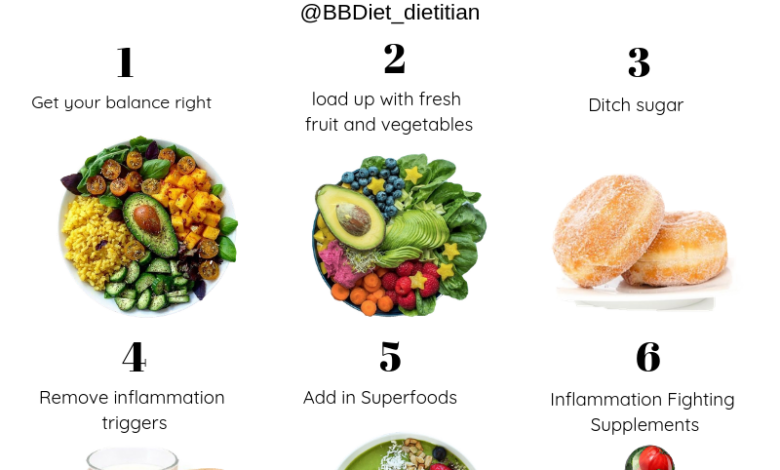
Things to Know Before Trying the Anti-Inflammation Diet
Things to know before trying the anti inflammation diet – Thinking about trying the anti-inflammation diet? It’s a popular approach to reducing chronic inflammation, but there are a few things you should know before diving in. The anti-inflammation diet focuses on consuming foods that naturally fight inflammation, while limiting those that contribute to it.
This diet is designed to promote overall health and well-being, potentially helping with conditions like heart disease, arthritis, and even autoimmune disorders.
But before you start swapping out your usual meals for anti-inflammatory alternatives, it’s crucial to understand the potential benefits, risks, and how it might interact with your current health status. It’s also important to consider your individual needs and lifestyle to ensure long-term success.
What is the Anti-Inflammation Diet?
The anti-inflammation diet is a dietary approach that focuses on consuming foods that help reduce inflammation in the body. It emphasizes whole, unprocessed foods rich in antioxidants, omega-3 fatty acids, and fiber, while limiting processed foods, sugary drinks, and unhealthy fats.
Foods Typically Included
The anti-inflammation diet encourages the consumption of a wide range of nutrient-rich foods. These foods are believed to possess anti-inflammatory properties and can contribute to overall health and well-being.
- Fruits and vegetables: Rich in antioxidants, vitamins, and minerals that help combat inflammation. Examples include berries, leafy greens, broccoli, and tomatoes.
- Whole grains: Provide fiber, which promotes gut health and reduces inflammation. Examples include brown rice, quinoa, oats, and whole-wheat bread.
- Lean protein sources: Provide essential amino acids for tissue repair and immune function. Examples include fish, poultry, beans, lentils, and tofu.
- Healthy fats: Omega-3 fatty acids, found in fatty fish like salmon, mackerel, and tuna, have potent anti-inflammatory effects. Other sources include olive oil, avocados, and nuts.
- Herbs and spices: Many herbs and spices, such as turmeric, ginger, garlic, and cinnamon, have anti-inflammatory properties.
Foods Typically Excluded
The anti-inflammation diet restricts certain foods that can contribute to inflammation in the body. These foods are often processed, high in sugar, unhealthy fats, or contain inflammatory ingredients.
- Processed foods: Processed meats, packaged snacks, and fast food are often high in unhealthy fats, sugar, and additives that can promote inflammation.
- Sugary drinks: Soda, fruit juice, and sweetened beverages are high in sugar, which can contribute to inflammation and weight gain.
- Trans fats: Found in fried foods, baked goods, and some processed foods, trans fats are known to increase inflammation and negatively impact heart health.
- Refined carbohydrates: White bread, pasta, and pastries are quickly digested and can spike blood sugar levels, contributing to inflammation.
- Alcohol: Excessive alcohol consumption can contribute to inflammation and damage the liver.
Examples of Anti-Inflammatory Foods, Things to know before trying the anti inflammation diet
The anti-inflammation diet emphasizes consuming foods rich in antioxidants, omega-3 fatty acids, and other anti-inflammatory compounds.
- Salmon: A rich source of omega-3 fatty acids, which have anti-inflammatory properties.
- Blueberries: High in antioxidants, particularly anthocyanins, which help protect against inflammation.
- Turmeric: Contains curcumin, a potent anti-inflammatory compound.
- Garlic: Known for its anti-inflammatory and immune-boosting properties.
- Olive oil: A healthy source of monounsaturated fats, which can help reduce inflammation.
Potential Benefits of the Anti-Inflammation Diet: Things To Know Before Trying The Anti Inflammation Diet
The anti-inflammation diet, rich in fruits, vegetables, whole grains, and lean protein, aims to reduce chronic inflammation in the body. While more research is needed, this dietary approach shows promise in improving various health conditions and promoting overall well-being.
Impact on Chronic Inflammation
Chronic inflammation is a low-grade, long-term inflammatory process that contributes to numerous diseases. The anti-inflammation diet focuses on reducing inflammation by limiting processed foods, refined sugars, and unhealthy fats, while emphasizing anti-inflammatory foods like omega-3 fatty acids, antioxidants, and fiber.
Benefits for Heart Health
Heart disease is a leading cause of death globally. The anti-inflammation diet can help reduce the risk of heart disease by lowering blood pressure, improving cholesterol levels, and reducing inflammation in the blood vessels. Studies have shown that diets rich in fruits, vegetables, and whole grains are associated with a lower risk of heart disease.
Benefits for Arthritis
Arthritis is a chronic condition that causes pain, stiffness, and swelling in the joints. The anti-inflammation diet may help manage arthritis symptoms by reducing inflammation in the joints. Research suggests that diets rich in omega-3 fatty acids and antioxidants may be beneficial for people with arthritis.
Benefits for Autoimmune Disorders
Autoimmune disorders occur when the body’s immune system attacks its own tissues. The anti-inflammation diet may help manage autoimmune disorders by reducing inflammation and modulating the immune system. Studies have shown that diets rich in fruits, vegetables, and whole grains may be beneficial for people with autoimmune disorders.
Benefits for Overall Health and Well-being
The anti-inflammation diet offers numerous benefits for overall health and well-being. It can improve digestion, boost energy levels, enhance mood, and promote healthy aging. By reducing inflammation throughout the body, this diet can contribute to a healthier and more vibrant life.
The anti-inflammatory diet can be a powerful tool for managing inflammation, but it’s important to understand that it’s not a quick fix. One of the key things to remember is that it’s not about eliminating entire food groups, but rather making mindful choices.
Learning strategies for eating in moderation is crucial, as it allows you to enjoy a variety of foods while still keeping inflammation in check. This diet isn’t just about what you eat, but also about how you eat, so paying attention to portion sizes and mindful eating habits is essential for success.
Considerations Before Starting the Anti-Inflammation Diet

While the anti-inflammation diet offers potential health benefits, it’s crucial to consider certain factors before embarking on this dietary approach. Understanding potential risks and interactions with existing medical conditions and medications is essential to ensure a safe and effective experience.
Potential Risks and Side Effects
The anti-inflammation diet, like any dietary change, can have potential risks and side effects. It’s important to be aware of these and take appropriate precautions.
- Nutrient Deficiencies:Restricting certain food groups can lead to deficiencies in essential nutrients. For example, eliminating red meat can limit iron intake, while avoiding dairy products can reduce calcium levels. It’s crucial to ensure adequate intake of essential nutrients through dietary diversification or supplementation.
Before diving into an anti-inflammatory diet, it’s crucial to consult your doctor, especially if you have underlying health conditions. A healthy diet goes hand-in-hand with a healthy lifestyle, and that includes staying active. It’s great to see gyms reopening, but it’s important to take precautions, like following guidelines for sanitation and social distancing, as outlined in this article on how gyms are reopening and steps to stay safe.
Remember, exercise can be a powerful tool for reducing inflammation, so find a safe and enjoyable way to get moving!
- Digestive Issues:A sudden shift to a restrictive diet can disrupt gut health and lead to digestive issues like constipation, diarrhea, or bloating. Gradual implementation and adequate hydration can help mitigate these effects.
- Social Isolation:The anti-inflammation diet often involves avoiding social gatherings where food is a central part. This can lead to social isolation, especially if friends and family don’t follow the same dietary restrictions. Finding ways to adapt the diet for social situations and finding support from others can help address this.
Interactions with Medical Conditions and Medications
The anti-inflammation diet can interact with existing medical conditions and medications.
- Blood Sugar Control:The diet’s emphasis on low-glycemic foods can benefit individuals with diabetes by improving blood sugar control. However, it’s essential to monitor blood sugar levels closely and consult with a healthcare professional to adjust medication doses if necessary.
- Kidney Function:For individuals with kidney disease, the diet’s restrictions on certain foods, such as high-potassium foods, might need adjustments to ensure adequate nutrient intake while managing kidney function. Consulting a nephrologist is crucial to personalize the diet.
- Medication Interactions:Some medications, such as blood thinners or cholesterol-lowering drugs, can interact with specific foods included or excluded in the anti-inflammation diet. Consulting with a pharmacist or healthcare professional is essential to ensure medication efficacy and safety.
Consulting a Healthcare Professional
Before starting the anti-inflammation diet, consulting with a healthcare professional, such as a registered dietitian or physician, is strongly recommended.
- Personalized Guidance:A healthcare professional can provide personalized guidance based on your individual health needs, medical history, and medications. They can help ensure the diet is safe and appropriate for you.
- Monitoring for Side Effects:A healthcare professional can monitor for any potential side effects and adjust the diet accordingly. They can also help identify any nutrient deficiencies and recommend appropriate interventions.
- Addressing Concerns:A healthcare professional can address any concerns you might have about the anti-inflammation diet and provide evidence-based information to help you make informed decisions.
Getting Started with the Anti-Inflammation Diet
The transition to an anti-inflammatory diet can be a gradual process. It’s important to start by understanding the key principles and gradually incorporating them into your lifestyle. This section provides practical tips for getting started, incorporating anti-inflammatory foods into your daily meals, and managing potential challenges.
Sample Meal Plan
A sample meal plan can offer a starting point for understanding how to structure your meals around anti-inflammatory foods. It’s essential to remember that this is just a guide, and individual needs may vary. Here’s a sample meal plan for a day:
- Breakfast:Oatmeal with berries, walnuts, and a sprinkle of cinnamon.
- Lunch:Salmon salad with mixed greens, avocado, and a lemon vinaigrette.
- Dinner:Grilled chicken breast with roasted vegetables (broccoli, bell peppers, and onions) and a side of quinoa.
- Snacks:A handful of almonds, a piece of fruit (apple, pear, or banana), or a small cup of plain yogurt with berries.
Incorporating Anti-inflammatory Foods into Everyday Meals
Integrating anti-inflammatory foods into your daily routine can be achieved through several practical tips.
Before diving into the anti-inflammation diet, it’s important to understand your triggers and make gradual changes. You’ll also need to be prepared for the inevitable social pressure, especially during the holidays. Navigating those food-pushing situations can be tricky, but there are ways to politely decline without feeling pressured.
Check out this great article on types of food pushers during the holidays and how to respond to help you stay on track. Once you’ve got your strategies in place, you’ll be ready to confidently embrace your new anti-inflammatory lifestyle.
- Focus on colorful produce:Include a variety of brightly colored fruits and vegetables in your diet. These are rich in antioxidants and phytonutrients that combat inflammation. Examples include blueberries, spinach, tomatoes, and sweet potatoes.
- Choose lean protein sources:Opt for lean protein sources like fish (salmon, tuna, mackerel), poultry (chicken, turkey), beans, lentils, and tofu. These provide essential nutrients and are lower in saturated fat.
- Use healthy fats:Incorporate healthy fats like olive oil, avocado oil, nuts, and seeds into your meals. These fats can help reduce inflammation and support overall health.
- Limit processed foods:Processed foods often contain high levels of unhealthy fats, sugar, and sodium, which can contribute to inflammation. Try to minimize your intake of these foods.
- Spice up your meals:Incorporate anti-inflammatory spices like turmeric, ginger, garlic, and cinnamon into your cooking. These spices have potent anti-inflammatory properties.
- Hydrate well:Drink plenty of water throughout the day. Staying hydrated helps flush out toxins and supports overall health.
Managing Cravings and Challenges
Making dietary changes can be challenging, and cravings are common.
- Be patient and consistent:It takes time to adjust to a new way of eating. Be patient with yourself and focus on making gradual changes. Consistency is key to success.
- Identify triggers:Pay attention to what triggers your cravings. Are you hungry, stressed, or bored? Once you identify your triggers, you can develop strategies to manage them.
- Find healthy substitutes:If you crave certain foods, try finding healthier substitutes. For example, instead of fried foods, try baked or grilled options.
- Seek support:Don’t be afraid to seek support from friends, family, or a registered dietitian. Having a support system can make a big difference in your journey.
- Focus on the benefits:Remind yourself of the potential benefits of following an anti-inflammatory diet. This can help you stay motivated and committed to your goals.
Long-Term Sustainability
The anti-inflammation diet, while beneficial for reducing inflammation, requires a commitment to long-term changes. It’s not a temporary fix but a lifestyle shift. Making this diet sustainable is key to enjoying its benefits and avoiding potential pitfalls.
Strategies for Long-Term Success
Sustaining the anti-inflammation diet involves adopting strategies that make it a part of your everyday life. These strategies focus on building healthy habits and incorporating the diet’s principles into your routine.
- Gradual Changes:Instead of drastic overhauls, make gradual changes to your diet. This helps you adapt to the new foods and reduce the likelihood of feeling overwhelmed. For example, start by swapping processed snacks for whole fruits and vegetables, and gradually increase the amount of anti-inflammatory foods you consume.
- Finding Enjoyment:The anti-inflammation diet is not about deprivation. It’s about finding enjoyable ways to eat healthy. Experiment with different recipes, explore new cuisines, and find anti-inflammatory foods that you genuinely enjoy.
- Planning and Preparation:Planning meals and preparing healthy snacks in advance can prevent impulsive choices and make sticking to the diet easier. This helps you avoid reaching for unhealthy options when you’re busy or tired.
- Mindful Eating:Pay attention to your body’s signals of hunger and fullness. Eating slowly and savoring each bite can help you feel more satisfied and prevent overeating.
- Seeking Support:Share your goals with friends, family, or a support group. Having a network of people who understand your journey can provide encouragement and accountability.
Building Healthy Habits
Healthy habits are the foundation of a sustainable anti-inflammation diet. They make it easier to follow the diet’s principles and maintain its benefits over time.
- Regular Exercise:Regular physical activity, even moderate exercise, can reduce inflammation and support overall health.
- Hydration:Staying hydrated is essential for overall health and can help flush out toxins that contribute to inflammation. Aim for at least eight glasses of water daily.
- Adequate Sleep:Sleep deprivation can increase inflammation. Aim for 7-9 hours of quality sleep each night.
- Stress Management:Chronic stress can contribute to inflammation. Find healthy ways to manage stress, such as yoga, meditation, or spending time in nature.
Monitoring Progress and Adjustments
Regularly monitoring your progress and making adjustments as needed is crucial for maintaining the benefits of the anti-inflammation diet.
- Tracking Your Diet:Keep a food diary or use a tracking app to monitor your intake of anti-inflammatory foods and identify any potential areas for improvement.
- Monitoring Symptoms:Pay attention to any changes in your symptoms of inflammation, such as joint pain, fatigue, or digestive issues.
- Seeking Professional Guidance:Consult with a healthcare professional or registered dietitian for personalized advice and support. They can help you tailor the diet to your specific needs and monitor your progress.
Final Summary
The anti-inflammation diet can be a powerful tool for improving your health, but it’s not a one-size-fits-all solution. By understanding the basics, potential benefits, and considerations, you can make an informed decision about whether it’s right for you. Remember to consult with your doctor before making any significant dietary changes, especially if you have existing health conditions.
And don’t forget to prioritize sustainability, finding ways to incorporate anti-inflammatory foods into your daily life in a way that feels manageable and enjoyable.






